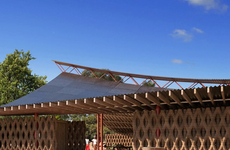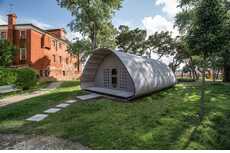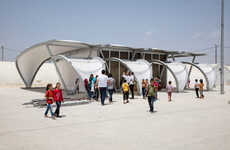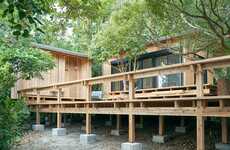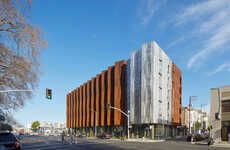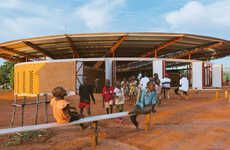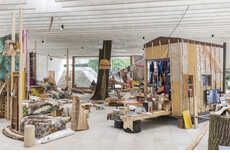
Tosin Oshinowo Has Designed the Ngarannam Village in Nigeria
Kalin Ned — July 28, 2022 — Art & Design
References: dezeen
A displaced community village was designed by architect Tosin Oshinowo. Located in northwest Nigeria and dubbed the Ngarannam village, this project is intended to support people whose settlements were destroyed by Boko Haram. This is a joint venture, supported by the Nigerian Government and the United Nations Development Programme (UNDP).
Tosin Oshinowo designed the displaced community village with 500 homes that are arranged in a grid. The center of the village is occupied by communal buildings—from gathering spaces to life necessities. Ngarannam includes a health clinic, a colorful marketplace, a community center, and a school, as well. When designing this project, Tosin Oshinowo took cues from local cultural aesthetics and understanding of function, the environmental terrain, as well as the existing resettlement—residents had already begun building before the onset of this project.
Image Credit: Dezeen
Tosin Oshinowo designed the displaced community village with 500 homes that are arranged in a grid. The center of the village is occupied by communal buildings—from gathering spaces to life necessities. Ngarannam includes a health clinic, a colorful marketplace, a community center, and a school, as well. When designing this project, Tosin Oshinowo took cues from local cultural aesthetics and understanding of function, the environmental terrain, as well as the existing resettlement—residents had already begun building before the onset of this project.
Image Credit: Dezeen
Trend Themes
1. Displaced Community Villages - Designing villages to support displaced communities facing housing constraints provides opportunities for architects and builders to integrate cultural aesthetics and create communal hubs offering health services and educational resources.
2. Cultural Aesthetic Integration - Integrating cultural aesthetics into community building projects provides opportunities for local artists and craftspeople to participate in rebuilding disrupted communities and encourages pride in local culture.
3. Public-private Partnerships - Collaborative endeavors between governments, NGOs, and private organizations to support displaced communities offer opportunities for community builders to scale projects and provide much-needed resources and infrastructure.
Industry Implications
1. Architecture - Architects have opportunities to participate in community building projects in displaced communities alongside health practitioners, educators, and community leaders to solve housing issues for sustainable development.
2. Cultural Industries - The integration of cultural aesthetics into community building projects in displaced communities provides economic opportunities for artists, craftspeople, and other creatives to showcase the local culture through public arts and crafts projects.
3. International Development - The demand for public, private and NGO partnerships supporting community building in displaced communities provides opportunities for international organizations to scale up community building innovations to solve housing crises and infrastructure deficits.
5.8
Score
Popularity
Activity
Freshness


